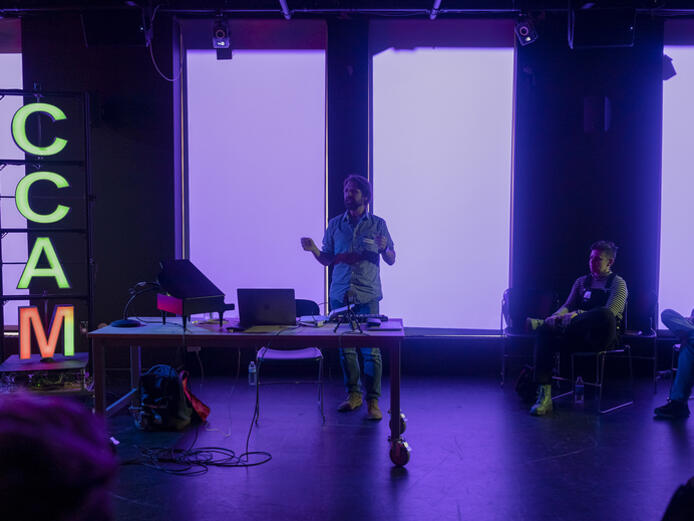Ultra Space Lab at CCAM

By Hailey O'Connor ’24
Yale’s Center for Collaborative Arts and Media (CCAM) supports creators and creatives in their efforts to bring art to life. CCAM is part of the cultural landscape at Yale alongside the Yale Art Gallery, Yale Center for British Art, and Arts corridor at Chapel and York, which includes the Schools of Architecture, Drama, and Art. CCAM is home to interdisciplinary curriculum and research at Yale, sponsoring up to twelve interdisciplinary courses per semester and running ongoing interdisciplinary research. Complimentary to its peer institutions like the MIT Media Lab and the Stanford D-School, CCAM leads with creativity that energizes an exchange with technology. CCAM’s unique creative ecosystem draws faculty and students from many disciplines — arts, architecture, engineering, and the sciences. The space acts as a lab and home for creatives at Yale, in New Haven, and within broader industry partnerships.
CCAM recently opened their “Ultra Space Lab,” which is rooted in the philosophy and work of Arakawa and Madeline Gins and is activated by the Yale School of Architecture course co-taught by CCAM Director Dana Karwas and Aurelia Institute CEO Ariel Ekblaw. The Ultra Space Lab at CCAM is a research project to explore and probe into how we see, understand, live in and interact with space — both terrestrial and interplanetary. It offers an environment to investigate the relationship between the body and space through themes of embodiment, movement and perception.
The Ultra Space approach is threefold — or, as Karwas refers to it — “M-cubed”: movement, mechanism, and meaning. Each project in the lab whether and artifact of architectural construct considers the M-cubed approach — which throws traditional plans and sections out the window. Projects start by considering how it moves: What is the mechanism? And why is it meaningful? Often projects go directly into 3D sketching, simulation, and prototyping to unfold into spatial dimensions. Ultra Space refrains from providing rigid definitions for the work it advocates, allowing for a spectrum of implementation ranging from digital to material forms.
Every year, the Mechanical Artifact Ultra Space course at the Yale School of Architecture partners with the Aurelia Institute and the MIT Space Exploration Initiative to organize a Zero-G parabolic flight, providing students with the opportunity to activate and test their space designs. These designs span from wearable space architecture to meaningful artifacts, offering an innovative approach to space exploration. The Ultra Space Lab also sponsors fellowships for both students and professionals, courses at Yale, and collaborations between peer institutions, exhibitions at the new CCAM ISOVIST gallery and publications.
The Spring 2024 Yale CCAM Ultra Space Symposium: Adaptation/s will take place April 4-5.
CCAM is an integral aspect of the Yale Innovation Ecosystem, offering interdisciplinary labs with an art-forward focus. At CCAM, an expansive curriculum spans diverse fields from art and architecture to public health, offering a dynamic platform for exploration and collaboration. Functioning as a dynamic laboratory, CCAM provides ground for faculty and students to experiment with cutting-edge technologies such as filmmaking techniques, virtual reality (VR), and artificial intelligence (AI). It serves as a hub for individuals to delve into research, ideation, and presentation, where creativity thrives in tandem with technology.
